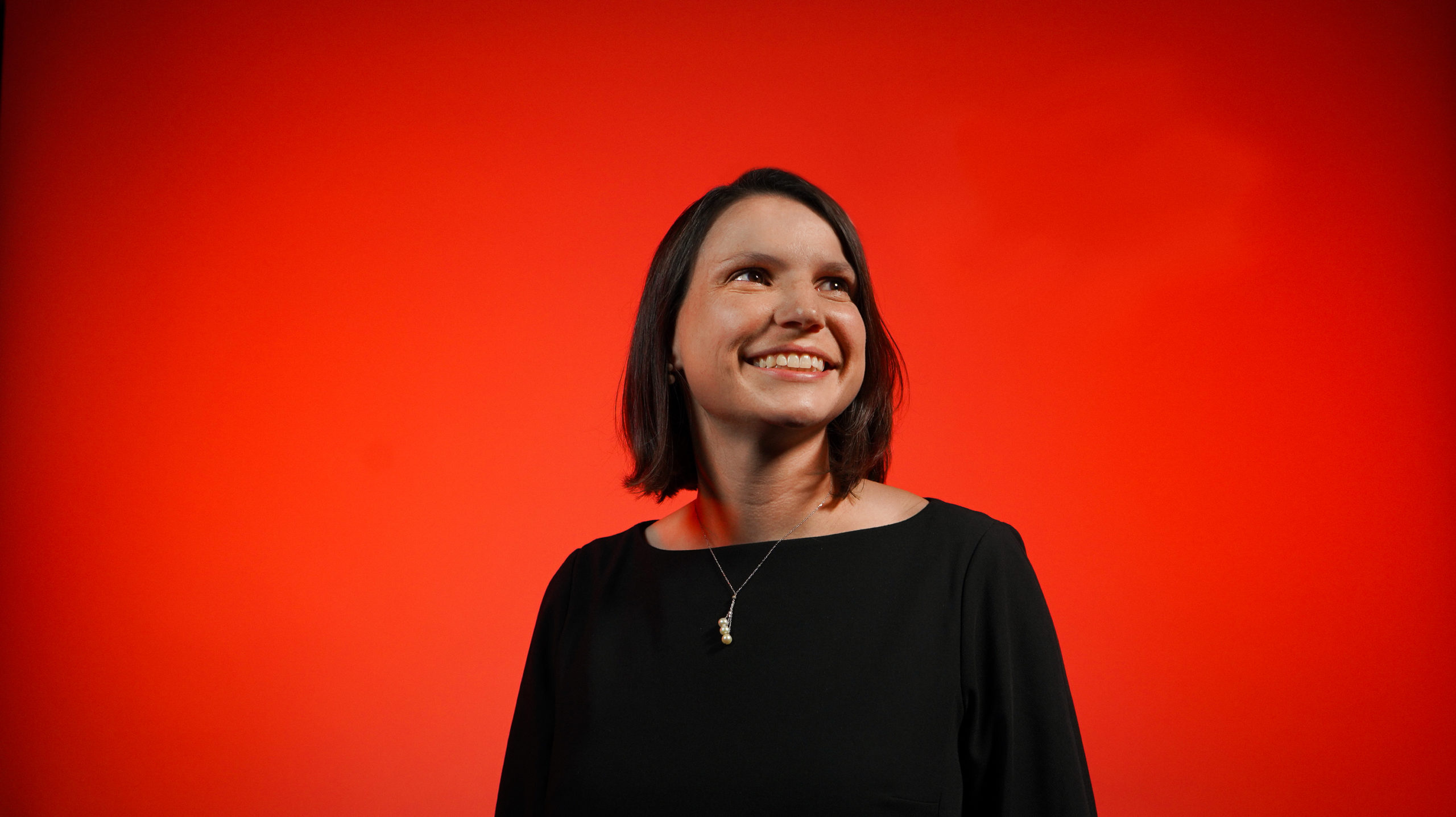Advancing Research
August 19, 2022
|
By Corey Munoz ’06
Mays Business School accounting scholar Sarah Stuber, Ph.D., is unique. The stand-out assistant professor of accounting leverages industry experience to design breakthrough research- challenging conventional wisdom surrounding audit and financial reporting practices.
To hear Stuber reflect on the topic with passion and energy makes her dynamic in the classroom. With contagious enthusiasm that belies any implication the topic is dry, she dissects historical assumptions about audit quality. Even the uninformed listener can appreciate the provocative nature of her research.
Challenging the Status Quo
Stuber began her career in public accounting and the financial sector. Moving from banking and audit to accounting for a collegiate athletic department, her attention was drawn back to academia. From there, she started pairing her industry knowledge and data-driven insights to ask and answer big questions in ways that academia encourages. She was eager to tackle audit literature through the lens of her experience with financial institutions. The common theme? Challenging accepted assumptions at the intersection of audit and financial reporting. She addresses the idea that high-quality audit looks like more- assurance, conservatism, regulation, procedures- and more auditing. Stuber and her colleagues contest these presuppositions, suggesting that more auditing doesn’t guarantee higher quality.
The goal of the Public Company Audit Oversight Board (PCAOB) is ‘to drive improvement in audit quality to protect investors.’ Often, when a PCAOB inspection identifies deficiencies in the audit process, more conservative financial reporting is the outcome. Historically, this has been considered appropriate, but Stuber takes issue. “If we introduce artificial conservative bias in communicating financial figures, the end result is still biased reporting.” Banks, for example, tend to be over-reserved in reporting estimated loan losses and, Stuber postures, “sometimes more conservative isn’t the right answer- because any bias threatens transparency.” Nate Sharp, Ph.D., head of the James Benjamin Department of Accounting and Nelson D. Durst Endowed Chair in Accounting agrees, “An audit should be a clear, transparent assessment that yields reliable financial reporting, and that’s not always the case.”
Stuber and Mays colleague, Matthew Ege, Ph.D. co-authored a Journal of Accounting and Economics article entitled, ‘Are auditors rewarded for low audit quality? The case of auditor lenience in the insurance industry.’ Prior literature assumes audit firms prioritize high audit quality- facing negative consequences for low audit quality- especially in work with highly regulated industries. This research suggests clients actually desire auditor lenience; and that in certain cases auditors are rewarded for leniency with increased market share and client retention, particularly when there is low risk of public disclosure of an audit failure (e.g., restatement or litigation).
Unintended Consequences
Stuber and coauthors also examined unintended consequences of the federal Paycheck Protection Program (PPP) and its impact on banking risk tolerance. Contrary to policymakers’ claims, the impact of the PPP on financial institutions risk taking was not neutral. “Ultimately, significant flow of federal funds through banks- and the resultant ability to make risk-free PPP loans- impacted how participating banks managed risk in their non-PPP lending,” explains Stuber. Stuber is challenging the status quo and regulators and practitioners are paying attention. Invited last year to present her findings to the Chicago Federal Reserve Bank, she and her coauthors expounded upon their paper ‘The Effect of the Paycheck Protection Program and Financial Reporting Standards on Bank Risk-Taking’.
“With scholars like Sarah researching these complex questions, groups inside and outside of the industry pay attention,” notes Sharp. “They want to better understand the implications- for academic research to rise to the level of the Federal Reserve Bank of Chicago is exceedingly rare.” Industry professionals and regulators could leverage findings of Stuber and her colleagues as a launch point- to improve audit quality and the usefulness of financial reporting.

The Aggie Network
Stuber says Mays equips her to thrive. “Access to the Aggie Network supports our ability to conduct meaningful research,” shares Stuber. From relationships with big accounting firms to access to data, financial resources, and opportunities to present to high-profile audiences, Stuber spotlights the immense role that Texas A&M plays in her work. Surrounded by supportive leadership and collaborative colleagues, scholars like Sarah can take intentional time to prioritize research and advance learning in complex areas.
Stuber recently received the Montague Center for Teaching Excellence Scholar award, given annually to one tenure-track assistant professor, per college, who excels in the classroom. “This award recognizes Dr. Stuber’s exceptional talents as an educator,” confirms Sharp. “She has great rapport with students and her real-world insights create an impactful learning experience.” Stuber relishes in connecting with her students. “Seeing those ‘lightbulb’ moments are so rewarding.” She takes joy in sharing her passion for accounting and the language of business.
“If these audit and reporting issues challenge highly regulated industries, what’s happening under less direct oversight? How can we grow audit literature to more precisely measure audit outcomes?” These are the questions and research opportunities keeping Stuber up at night.
How might the future look if regulatory and industry institutions applied her research? “An increasingly thoughtful approach to implementation of policy and a more sophisticated, nuanced approach to financial reporting and audits,” shares Stuber. With experience, a creative way to challenge assumptions, and the generous support from Aggies, Stuber is creating a big impact with research originating at Texas A&M.


